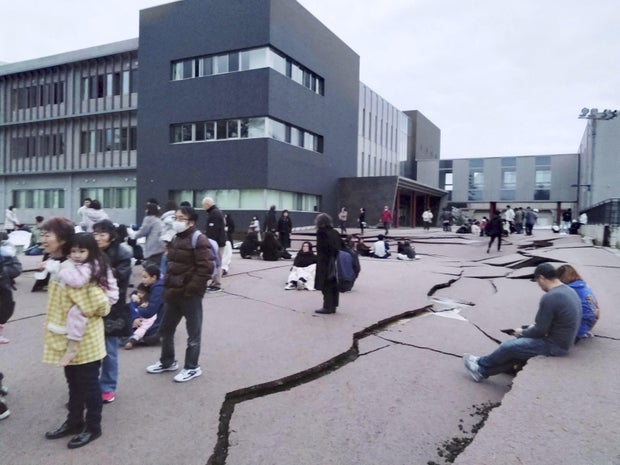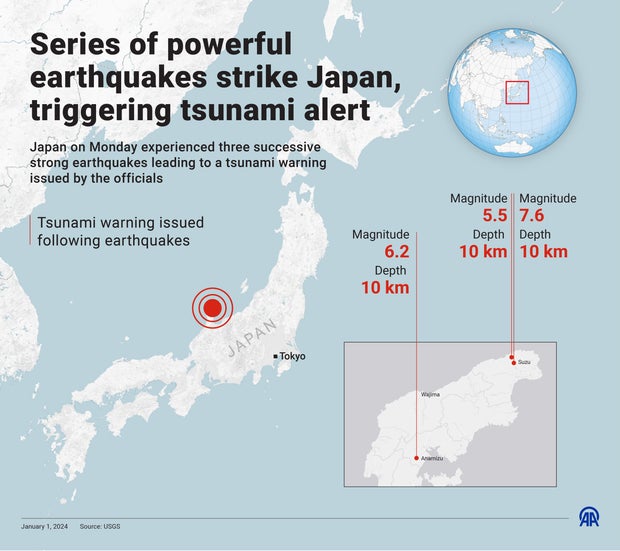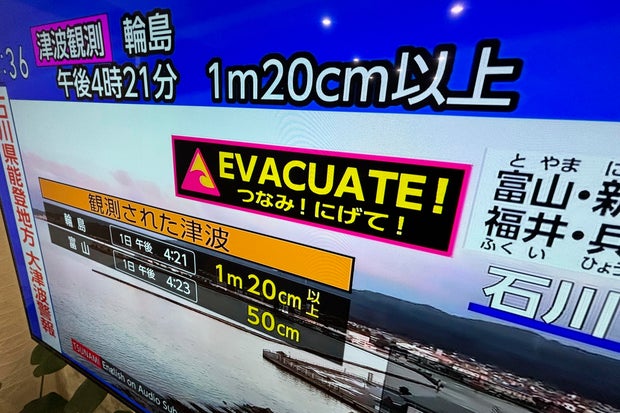Powerful earthquakes off Japan's west coast prompt tsunami warnings
World

Updated on: January 1, 2024 / 4:48 AM EST / CBS/AP
A series of powerful earthquakes off central Japan's west coast prompted tsunami warnings Monday and residents were urged to seek higher ground. The Japan Meterological Agency (JMA) said the Noto region, on the western side of Japan's main island of Honshu, was hit by a rapid series of quakes — about 20 in total — starting with a 5.7 magnitude temblor at 4:06 p.m. local time.
That was followed by a major 7.6-magnitude quake just four minutes later, then a 6.1 magnitude temblor at 4:18 p.m., a 4.5 magnitude one at 4:23 p.m., a 4.6 magnitude quake at 4:29 p.m., and a 4.8 magnitude quake at 4:32.
The first tsunami waves, around four feet high, hit Ishikawa prefecture's Wajima port about an hour after the quakes struck, and there were warnings of more possible tsunami, as high as 16 feet, still to come in Ishikawa.
Road cracks caused by an earthquake are seen in Wajima, Ishikawa prefecture, Japan, Jan. 1, 2024, in a photo released by Kyodo. Kyodo via REUTERSPresenters on the national broadcaster NHK urged people in the region to leave everything behind and move quickly to higher ground.
"Hazardous tsunami waves from this earthquake are possible within 300 km [about 186 miles] of the epicenter along the coasts of Japan," the Hawaii-based Pacific Tsunami Warning Center said, while the Japan Meteorological Agency warned the waves could be up to five metres high.

Power companies that operation nuclear plants in the region said they were checking for any irregularities but reported no immediate problems, and the government later appeared to confirm the safety of the plants.
"It has been confirmed that there are no abnormalities at Shika nuclear power plant [in Ishikawa] and other stations as of now," Hayashi Yoshimasa, a spokesperson for the national government said, according to the AFP news agency.
There was damage from the quakes, however, and video aired by NHK showed what appeared to be buildings collapsing in Ishikawa. The network said buildings shook all the way on the other side of Japan, in the capital Tokyo, and Yoshimasa said authorities were still checking the extent of damage in the affected regions in the west.
An infographic shows where a series of powerful earthquakes struck Japan, triggering tsunami alerts, Jan. 1, 2024. Muhammed Ali Yigit/Anadolu/GettyThe Reuters news agency quoted utilities provider Hokuriku Electric Power as saying more than 36,000 households lost electricity in the Ishikawa and Toyama prefectures.
Japanese news video showed reddish smoke spewing from an area in Wajima city, in Ishikawa, noting there could be a fire there. Details were not immediately available. A house crumbled in another area, and a search was underway to see if people were trapped in the rubble.

Bullet trains in the area were halted. Parts of the highway were also closed, and water pipes had burst, according to NHK.
Japanese media reports showed a crowd of people, including a woman with a baby on her back, standing by huge cracks that had ripped through the pavement.
The Meteorological Agency said in a nationally broadcast news conference that more major quakes could hit the area over the next week, especially in the next two or three days.
Tsunami warnings were also issued for Japan's northernmost main island of Hokkaido and for parts of North Korea and Russia. Russian officials issued a tsunami alert for the island of Sakhalin, warning that areas across the island's west coast could be affected by the waves.
A tsunami warning is shown on TV in Yokohama, near Tokyo, Japan, Jan. 1, 2024 after several powerful earthquakes struck west of the country's main island. Eugene Hoshiko/APIn nearby South Korea, the weather agency urged residents in some eastern coastal towns to watch for possible changes in sea levels. Tsunami waves that hit later later can be bigger than the initial ones.
The Japanese government has set up a special emergency center to gather information on the quakes and tsunami and relay them speedily to residents to ensure safety, Prime Minister Fumio Kishida told reporters.
He reiterated the warning for immediate evacuation in affected areas.
A huge earthquake and tsunami struck northeast Japan on March 11, 2011, devastating a vast swathe of the country's coastline and triggering nuclear reactor meltdowns in Fukushima.
In: Breaking News Asia Japan EarthquakeThanks for reading CBS NEWS.
Create your free account or log in for more features.
Please enter email address to continue
Please enter valid email address to continue

























































